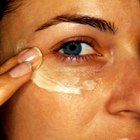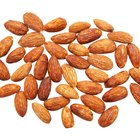
Vitamin C, which is one of the better known antioxidants, helps treat and prevent acne by nurturing and protecting your skin, according to Acne-Resource.org. Vitamin C works as a skin barrier to fight against free radicals caused by such toxins as bacteria and pollution. Take advantage of the benefits of vitamin C for your facial pores--it can reduce blemishes and keep your pores clear.
Elastin and Collagen

Vitamin C fights against free radicals that damage your skin. It also helps rejuvenate your skin by promoting elastin and collagen development. Whether you ingest vitamin C through food or as a supplement, or you use a topical vitamin C formula, it helps produce elastin and collagen while it releases oil and dirt in skin pores, according to DocShop.com. Collagen and elastin are essential proteins needed to make new skin, according to the University of Maryland Medical Center.
Wound Recovery

Another benefit of vitamin C for facial pores is its ability to help heal skin. Topical vitamin C works directly on skin to heal pores as it stabilizes collagen, according to DermNetNZ.org. Vitamin C in any form speeds up wound recovery. It directly heals “acne-prone skin” and thwarts the development of blemishes, according to Acne-Skin-Care.ca.
Inflammation
Unsightly blemishes may be one of the worst aspects of acne. In addition to preventing new blemishes, vitamin C also helps with existing plugged and irritated pores. As vitamin C helps regenerate skin, it also reduces inflammation of pimples, according to Acne-Skin-Care.ca. Apply vitamin C as a topical solution or take it as a supplement to help with inflammation from acne.
Herbs and Vitamin C

Herbs recommended for acne because of their skin healing properties often also contain vitamin C, according to the book "Herbal Remedies" by Andrew Chevallier. Such herbs include burdock, yellow dock and red clover. While these herbs primarily are taken orally to detoxify or cleanse the body, they may be used in a topical solution as well, according to "Herbal Remedies." Consult your health care provider before using herbs with vitamin C to improve your facial pores.
Rosewater, which is distilled from rose petals, often is used as an astringent and anti-inflammatory to soothe and tone skin pores, according to "Herbal Remedies." Rose hips contain a large amount of vitamin C, and often are mixed into a syrup to fight infection.
Related Articles

What Are the Benefits of Ashwagandha in ...

How to Maintain Good Skin After Accutane

Are There Ways to Get Rid of Blocked ...

Arnica for Acne

List of Retinoids

Alternatives to La Mer Creme

Papaya & Acne

Glucosamine: Skin Benefits

Can You Decrease Sebum With Vitamin A?

Help for Red Marks After Facials

How to Use Copper Peptide With Vitamin C

Skin Care Products That Contain ...

What Is the Difference Between Facial ...

How to Even Out Skin Tone Without Makeup

Products Used in Maintenance on the ...

Cleansers for Rosacea That Unclog Pores

Can Any Home Remedies Get Rid of Acne ...

How to Remove Red Scars on Your Face

Instructions for Using Mandelic Acid

Can Tri-Luma Be Used to Fade Acne Scars?
References
Resources
- "Herbal Remedies"; Andrew Chevallier; 2010
- MicrodermabrasionAdvice.com: Vitamin C & Glycolic Acid Facial Skin Care
Writer Bio
Cat North began writing for the Web in 2007. Her work appears on various websites such as WORK.COM and info.com. Her writing expertise includes dance, fitness, health, nutrition, media, Web, education and business. She holds a Bachelor of Science in radio, television and film from the University of Texas and a Master of Business Administration in computer information systems from City University.
Photo Credits
orange and red orange fruit image by Tomo Jesenicnik from Fotolia.com